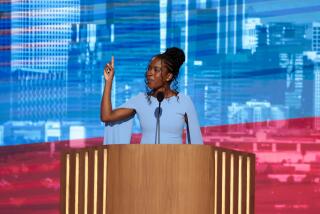The Beat goes on in Jack Hirschman
- Share via
SAN FRANCISCO — Half a century ago, a young writer named Jack Hirschman wrote to Ernest Hemingway, seeking advice. He was stunned when perhaps the world’s most famous author wrote back.
“I can’t help you, kid,” Hemingway wrote. “You write better than I did when I was 19. But the hell of it is, you write like me. That is no sin. But you won’t get anywhere with it.”
Hirschman took the advice, developing a working-class style of poetry that made him a vital, if lesser-known, voice of the Beat Generation.
Now, San Francisco’s poet laureate may be the best surviving example of the values and dreams of that literary culture, which is slowly being consigned to textbooks.
“I believe that everyone is a poet,” the 72-year-old avowed Marxist says in his booming New York accent. “Everybody is a poet, nobody excluded.”
Dressed in a denim jacket and sneakers with a mischievous twinkle in his eye, he’s sipping his second espresso of the day at Caffe Trieste, a landmark in the city’s North Beach neighborhood, epicenter of Beat culture.
The onetime college professor lost his academic post and became a street poet. He has spent a lot of the last 35 years sitting right here. He drank thousands of espressos, learned to translate Russian, finished books and argued with his friend Allen Ginsberg. Most of his contemporaries moved on long ago or died, but Hirschman is still here.
His poems are angry, provocative and often political.
His work can also be tender, as in “The Love Poem”: “there is a language called / soul, a tongue that is / the kiss that’s the bliss / of all blisses. Untranslatable.”
Lawrence Ferlinghetti, founder of City Lights Books, nominated Hirschman this year to be the city’s fourth poet laureate.
“There’s a lot of poets who claim to be pure poets but they don’t really have the talent to justify it. Jack does,” he said.
Hirschman grew up in the Bronx, the son of working class parents, and dreamed of becoming a reporter. He worked for the Associated Press as a copy boy from 1951 to 1955, writing poems in his spare time.
Hirschman abandoned journalism, earned a doctorate in comparative literature at Indiana University, and became a professor at UCLA.
Hirschman opposed the Vietnam War. While teaching at UCLA, he heard “A” students were excused from the draft.
“I announced that everyone who was draft eligible got the grade of ‘A,’ ” he says. “So I was terminated.”
In retrospect, Hirschman thinks it may have been the best thing that happened to him. He moved to San Francisco and became a fixture in North Beach.
“It wasn’t that losing the job freed me to do poetry,” Hirschman says. “But I did began to live my life just as a poet when I left the university.”
Hirschman is busier than ever. His most ambitious work, a 1,000-page compilation called “Arcanes,” will be published this month by Italy’s Casa della Poesia. Critics have compared it to William Carlos Williams’ “Patterson” and Ezra Pound’s “Cantos.”
Hirschman also speaks at antiwar rallies. Ferlinghetti says he captivates readers with his obvious love of language.
“The only other modern poet who had a voice as good as Jack was Allen Ginsberg,” he says. “They both have a great deep voice, a lush voice.”
More to Read
Sign up for our Book Club newsletter
Get the latest news, events and more from the Los Angeles Times Book Club, and help us get L.A. reading and talking.
You may occasionally receive promotional content from the Los Angeles Times.







